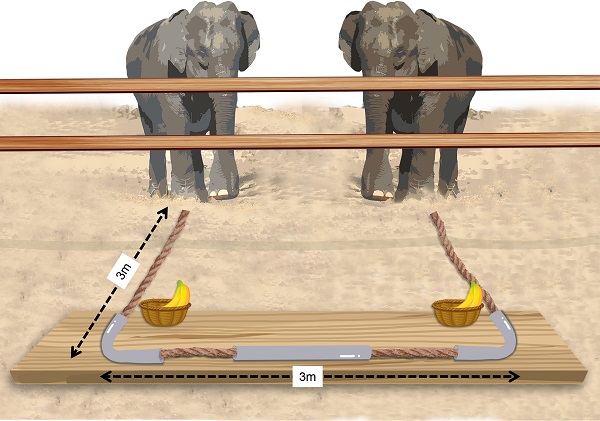
Newsroom
Cooperation (i.e., joint action for common benefits) is a widespread social construct in the animal kingdom, as it aims to maximize benefits through joint action. It has been hypothesized that mitigation mechanisms have co-emerged to manage competition. However, research in this area is limited, especially in nonprimates.
In a recent study published in Plos Biology, researchers from the Xishuangbanna Tropical Botanical Garden (XTBG) of the Chinese Academy of Sciences and their collaborators investigated the varying levels of competition and cooperation in a controlled experimental study with Asian elephant (Elephas maximus). They found that cooperation was maintained at a high rate (more than 80% of the time) even in the face of competition, and only broke down when the food on the table was limited and could easily be monopolized.
In order to understand how elephants maintain their cooperative relationships when competition can occur, the researchers studied a group of nine semi-wild Asian elephants in Myanmar by exposing them to an open-access loose-string pulling apparatus.
The researchers offered two (2) food trays on the apparatus first to observe whether competitive behavior appeared and how the elephants mitigated this behavior across pairings to maintain cooperation. They then reduced 2 food trays to one (1) to see if cooperation continued when food was limited.
In the 2-tray phase in which 1 tray of food was placed on either end of the table, the cooperation frequency was high. However, after changed from the cooperative 2-tray to the more competitive 1-tray condition (in which the food remained divisible but was clumped in 1 tray), cooperation broke down quickly.
It was clear the elephants wanted to continue cooperating and thus often adopted various strategies to mitigate competition. Elephants applied "block," "fight back," "leave," "move side," and "submission" as mitigation strategies and adjusted these strategies according to their affiliation and rank difference with competition initiators.
“When food resources were limited, costly competition behaviors ("monopoly" and "fight") prevailed, leading to the breakdown of cooperation," said Li Lili of XTBG.

The loose-string cooperation apparatus was placed outside of the enclosure so that the table was not accessible to the elephants at the beginning of a trial. (Image by LI Lili)
